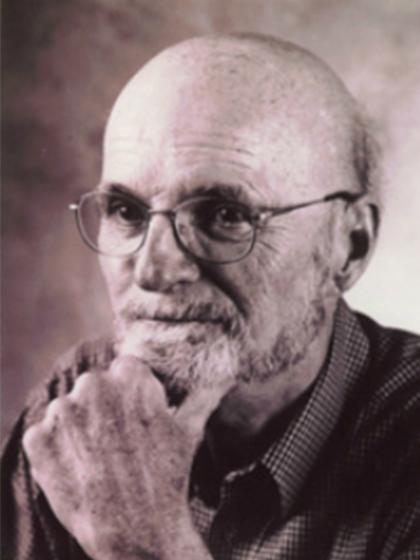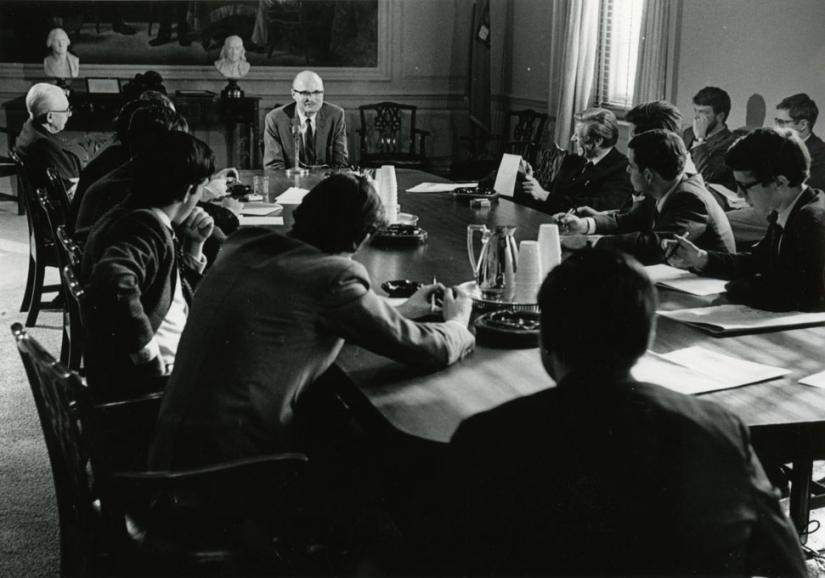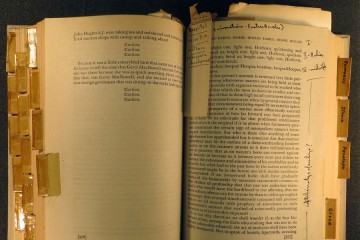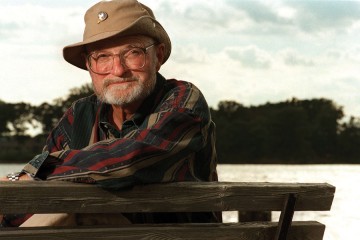John Barth, A&S '51, '52 (MA), groundbreaking and prolific author, revered teacher, and professor emeritus in The Writing Seminars at Johns Hopkins University, died Tuesday. He was 93.

Image caption: John Barth
Best known for his postmodernist, unpredictable fiction and his exacting and generous teaching, Barth served on the Johns Hopkins faculty from 1973 until he retired in 1995. He is the author of 17 novels and collections of short fiction and three collections of essays. He won a National Book Award, F. Scott Fitzgerald Award for Outstanding Achievement in American Fiction, a Lannan Foundation Lifetime Achievement Award, and the PEN/Malamud Award for Excellence in the Short Story.
"Not just a master of fiction and of the literary essay, John Barth was a rhetorician on the order of a Samuel Johnson," said Jean McGarry, A&S '83 (MA), Academy Professor and Barth's former student and then colleague in The Writing Seminars. "Well-read and deeply thoughtful, it was a pleasure to be in his company, whether as his student or colleague. Passionate about literature, and with peerless taste, he was full of wit and wisdom, and had an almost scientific gift for anatomizing the elements of fiction: bones, flesh, nerves, heart, and lungs. He was also funny, tall, and handsome, and never missed a trick. In a rare way, he epitomized his fiction in his own gallant and witty person."
Barth's upbringing on Maryland's Eastern Shore left a powerful echo in the coastal settings of many of his books as well as the understated, southern lilt to his voice. After almost embarking on a career as a jazz drummer, Barth stumbled into what was then Johns Hopkins' Writing, Speech, and Drama department. In a 1999 oral history with the Sheridan Libraries' Mame Warren that revealed a self-deprecating sense of humor, he credits his "a la carte" education (his job reshelving books from wheeled carts in the classics and Oriental Seminary stacks of the old Gilman library) with filling in much of the literary background he had not yet accrued.
After earning his master's degree at Hopkins, Barth served on the faculty of Penn State, SUNY Buffalo, and Boston University before returning to Hopkins as professor in what had then become The Writing Seminars with a joint appointment in the English department. He invited authors including Salman Rushdie, Grace Paley, John Updike, Raymond Carver, Joyce Carol Oates, and Italo Calvino to read from their work, and they did.
As a teacher, he was famous for never imposing his own style on his students, instead imparting to them a sense of both imagination and craftsmanship. His keen ear as a reader made him a deeply admired mentor; leading by example, he showed students how to dissect stories, listen for style and voice, and discern worthy storytelling—whether in their own writing or that of others.
"One of the delights of sitting in his classroom was hearing him X-ray a story, finding its hidden bone structure and energy source, and still be helpful in cutting away the fat," McGarry wrote for a festschrift for Barth in 2015.
Also see
Michael Martone, A&S '79 (MA), remembers driving to Cambridge, Maryland, for the viewing when Barth's father died. "What I remember is that he told us three stories about funerals he had attended with the usual perfect presentation of his storytelling. It was amazing," said Martone, professor emeritus in the University of Alabama's Department of English. "That even in the midst of that moment he was composing the narratives that would become part of his future narratives and mine. He was all about the story and the famous Freytag pyramid. Stories have beginnings, middles, and ends, and each part needed tending, revising, and amending. And each part is connected, entwined, and harmonic.
"He was my teacher but also my first and always 'outside' reader," Martone added, noting that Barth had pledged on the first day of class to read his former students' published work if they sent it to him. "I did for forty-plus years, everything I published in magazines and books. And he responded every time with a brief note of receipt and a message of thanks and 'keep going, don't stop.'"

Image caption: John Barth is seated at the head of the table in the old board room at Shriver Hall in this image from the 1970s.
Image credit: Courtesy of the Ferdinand Hamburger Archives, Johns Hopkins University
Barth's fiction has been described as striking a commanding balance between postmodern self-consciousness and wordplay, and displays the characterization and compelling plot more common in more traditional genres. In works described as playful and challenging, funny and deadly serious, his plots fragment and his points of view shift. He covered ground from the Chesapeake Bay to the Bronze Age city Mycenae to a generic housing development. His translated works found wide audiences in languages including Finnish, Greek, Hungarian, Italian, Japanese, and Polish, and continue to make significant appearances in public readings, recordings, adaptations, reviews, and critical essays.
Barth's writing veered from the existential to comical nihilism to metafiction; in 1987's "The Tidewater Tales," a minimalist novelist and maximalist oral historian tell each other stories while sailing around the Chesapeake. "Lost in the Funhouse" features a 13-year-old boy exploring Ocean City, Maryland, with his family and simultaneously commenting on his own story, leaving readers reeling between the plot and the commentary as if visiting a boardwalk funhouse. Other best-known works include "The Sot-Weed Factor," "The Floating Opera," "Giles Goat-Boy," and "Chimera," for which he received the National Book Award for fiction in 1973
In 1995, Barth retired from Hopkins and became a senior fellow at Washington College in Chestertown, Maryland. He received an honorary Doctor of Humane Letters degree from Hopkins in 2011, was a fellow of the American Academy of Arts and Sciences, and was elected to the American Academy of Arts and Letters.
The Johns Hopkins Sheridan Libraries hold collections of Barth's manuscripts and books from his personal library, acquired in 2014. A 2015 exhibit introduced the collection to the public. Typescript drafts with Barth's handwritten corrections offer a glimpse into his writing process, while reviews and critical analyses reveal evolving attitudes toward postmodernism and meta-fiction. The Sheridan Libraries are also processing newly acquired materials, including a set of letters between Barth and his long-time friend and fellow writer Daniel Tamkus. Additional papers can be found at the Library of Congress.
Tagged literature, writing seminars, john barth, obituary










